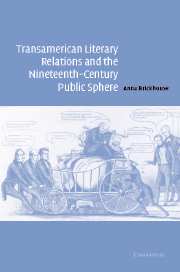Book contents
- Frontmatter
- Contents
- Acknowledgments
- Note on texts and translations
- Prologue
- 1 Introduction: transamerican renaissance
- 2 Scattered traditions: the transamerican genealogies of Jicoténcal
- 3 A francophone view of comparative American literature: Revue des Colonies and the translations of abolition
- 4 Cuban stories
- 5 Hawthorne's Mexican genealogies
- 6 Transamerican theatre: Pierre Faubert and L'Oncle Tom
- Epilogue
- Notes
- Index
4 - Cuban stories
Published online by Cambridge University Press: 22 September 2009
- Frontmatter
- Contents
- Acknowledgments
- Note on texts and translations
- Prologue
- 1 Introduction: transamerican renaissance
- 2 Scattered traditions: the transamerican genealogies of Jicoténcal
- 3 A francophone view of comparative American literature: Revue des Colonies and the translations of abolition
- 4 Cuban stories
- 5 Hawthorne's Mexican genealogies
- 6 Transamerican theatre: Pierre Faubert and L'Oncle Tom
- Epilogue
- Notes
- Index
Summary
CUBAN WRITERS, US READERS: TRANSMISSION AND APPROPRIATION IN THE 1840S
Writing in exile in New York, José Martí detailed for the July 1888 issue of the Economista Americano the literary career of a countryman who had died a half-century earlier, José María Heredia, “the first poet of America.” As is always the case with “the poetic soul,” Martí explains, Heredia had early suffered a great need for beauty that led him to follow the steps of poets before him, and that infused “his first sentiments, his first prose” with imitative paeans to the literary past. Yet in the case of great poets, Heredia among them, such slavish gestures soon outpace their models: “From these impulses comes vibrating genius, like a sea of sonorous waves, from Homer to Whitman.” If Martí placed Walt Whitman at one end of a genealogy of poetic grandeur, he had a less favorable evaluation of Whitman's contemporary, William Cullen Bryant, who had died just ten years before Martí's essay appeared. Hailed since the early 1840s, both abroad and at home, as the leading poet of his country and the first to achieve worldwide fame, Bryant was, Martí acknowledges elsewhere, “illustrious,” “socratic,” “a thinking poet.” But Bryant's life had been “excessively gentle”; and Martí defines the US writer accordingly (and scathingly) as “a poet, a white poet, in the comfortable style of Wordsworth, not like those unfortunate and glorious ones who nourish themselves on their own entrails.”
- Type
- Chapter
- Information
- Publisher: Cambridge University PressPrint publication year: 2004

